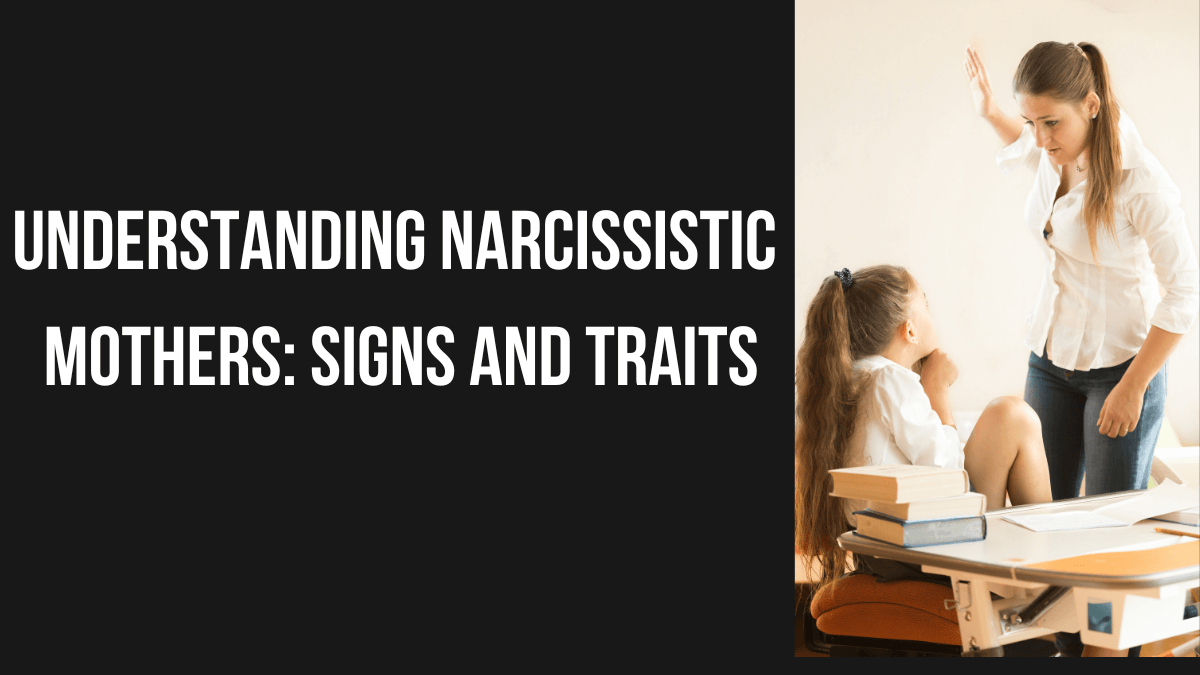In this blog post, we will explore the topic of narcissistic mothers, a parent who has a narcissistic personality disorder or displays patterns of self-centeredness, entitlement, and lack of empathy. Living with a narcissistic mother can be emotionally draining and have a lasting impact on a child’s mental health and well-being.
We will discuss the ten most common signs of a narcissistic mother, including dominating behavior, emotional manipulation, and favoritism or scapegoating. Additionally, we will cover the causes of narcissistic personality disorder and how to deal with a narcissistic mother.
Whether you have a history of a strained relationship or currently live with a narcissistic mother, we aim to provide you with valuable information and strategies to improve your well-being and overall quality of life.
What is Narcissistic mother?

A narcissistic mother is a parent who has a narcissistic personality disorder or displays narcissistic patterns of self-centeredness, entitlement, and lack of empathy. Narcissistic mothers often dominate conversations and family dynamics, and may try to control every aspect of their children’s lives.
Signs of Narcissistic Mother
Here are ten common signs of a narcissistic mother:
1.Dominating behavior
A narcissistic mother often dominates conversations and family dynamics, and may try to control every aspect of her children’s lives.
2. Emotional manipulation
Narcissistic mothers often use emotional manipulation to get their children to comply with their wishes. They may guilt-trip their children or use other tactics to make them feel responsible for the mother’s feelings or well-being.
3. Inability to empathize
Narcissistic mothers have a limited ability to empathize with their children’s emotions or experiences, and may dismiss or belittle their feelings.
4. Favoritism or scapegoating
Narcissistic mothers may play favorites among their children, often pitting them against each other. They may also choose one child to be the scapegoat and blame them for all of the family’s problems.
5. Invalidation of feelings
Narcissistic mothers may invalidate their children’s emotions or experiences, telling them that their feelings are wrong or that they are overreacting.
6. Excessive need for attention and admiration
Narcissistic mothers often crave attention and admiration from others, and may use their children to get it. They may also feel entitled to special treatment and privileges.
7.Entitlement and grandiosity
Narcissistic mothers often have an inflated sense of self-importance and entitlement. They may expect special treatment or privileges and may become angry or resentful when they don’t get them.
8. Lack of boundaries
Narcissistic mothers often have poor boundaries and may intrude into their children’s personal lives or become overly involved in their activities.
9. Lack of accountability
Narcissistic mothers often refuse to take responsibility for their actions or apologize for their mistakes, instead blaming others or making excuses.
10. Projection of her own insecurities onto others
Narcissistic mothers may project their own insecurities or flaws onto their children, making them feel responsible for the mother’s problems or shortcomings.
It’s important to note that not all narcissistic mothers exhibit all of these signs, and some may display them in different ways. However, if you recognize several of these signs in your own mother, it may be a sign of narcissistic personality disorder.
Narcissistic mother traits

While there are some common traits associated with narcissistic mothers, there are also some less talked about or uncommon traits that may be present.
“A narcissistic mother sees her children as extensions of herself, rather than unique individuals with their own needs and desires.”
Karyl McBride
Here are a few examples:
1. Victim mentality
While narcissistic mothers are often characterized as being grandiose or entitled, some may also adopt a victim mentality. This can involve playing the role of the victim in situations, shifting blame onto others, and seeking sympathy and attention from others.
2. Perfectionism
Narcissistic mothers may hold themselves and their children to impossibly high standards, leading to a constant sense of pressure and a fear of failure. They may also be highly critical of themselves and their children, which can erode self-esteem and confidence.
3. Passive aggression:
Some narcissistic mothers may use passive-aggressive tactics to manipulate or punish their children. This can involve indirect communication, such as giving the silent treatment or using sarcasm or irony to convey negative messages.
4. Hypersensitivity
While narcissistic mothers may be insensitive or dismissive of their children’s feelings and needs, some may also be hypersensitive themselves. They may be easily offended or hurt, and may react with anger or aggression when their feelings are challenged or questioned.
What Narcissistic Mothers do

Narcissistic mothers may interact with their children in ways that can be harmful to their emotional well-being and development. Here are some things that narcissistic mothers may do with their kids:
1.Make their children responsible for their emotional needs
Narcissistic mothers may rely on their children to meet their emotional needs, rather than providing emotional support to their children.
2. Play favorites
Narcissistic mothers may show favoritism towards one child over another, which can create a competitive and hostile environment among siblings.
3. Criticize and belittle
Narcissistic mothers may criticize and belittle their children, leading to feelings of shame, low self-esteem, and self-doubt.
4. Use emotional manipulation
Narcissistic mothers may use emotional manipulation, such as guilt-tripping, to control their children’s behavior and meet their own needs.
5. Invade personal boundaries
Narcissistic mothers may invade their children’s personal boundaries, such as invading their privacy, controlling their social lives, or making decisions for them without their input.
6.Gaslighting
Narcissistic mothers may use gaslighting, which is a form of psychological manipulation that involves making the victim question their own sanity or perceptions, to control their children.
7. Refuse to take responsibility for their mistakes
Narcissistic mothers may refuse to take responsibility for their mistakes or apologize for their behavior, instead blaming their children or other external factors.
8. Use their children for their own gain
Narcissistic mothers may use their children for their own gain, such as using them to gain attention or validation from others.
These behaviors can have a lasting impact on a child’s emotional well-being and development, and it’s important for children of narcissistic mothers to seek support and develop healthy coping mechanisms.
Sons of Narcissistic mother
Sons of narcissistic mothers may face a unique set of challenges in their relationships and personal lives. Here are some common experiences that sons of narcissistic mothers may have:
1. Emotional neglect
Sons of narcissistic mothers may experience emotional neglect, as their mother’s focus is often on her own needs rather than her son’s emotional needs.
2. Competition with siblings
Narcissistic mothers may create a competitive environment among siblings, where brothers may be pitted against each other for their mother’s attention and affection.
3. Guilt and shame
Sons of narcissistic mothers may experience guilt and shame, as they may feel responsible for their mother’s emotional well-being or may have been blamed for her problems.
4. Low self-esteem
Narcissistic mothers may criticize and belittle their sons, leading to low self-esteem and feelings of inadequacy.
5. Enmeshment
Sons of narcissistic mothers may experience enmeshment, where their mother may intrude into their personal lives or become overly involved in their activities, leading to a lack of autonomy and independence.
6. Difficulty in relationships
Sons of narcissistic mothers may struggle in their relationships, as they may have difficulty establishing healthy boundaries and may repeat patterns of unhealthy behavior.
7. Fear of abandonment
Sons of narcissistic mothers may have a fear of abandonment, as their mother’s emotional support may have been unpredictable or conditional.
Daughters of Narcissistic mothers
Daughters of narcissistic mothers may experience a range of emotional and psychological effects due to their upbringing. Here are some common experiences that daughters of narcissistic mothers may have:
1. Emotional manipulation
Daughters of narcissistic mothers may experience emotional manipulation, where their mother’s needs take priority over their own emotional needs.
2. Criticism and belittling
Narcissistic mothers may criticize and belittle their daughters, leading to feelings of shame, low self-esteem, and self-doubt.
3. Enmeshment
Daughters of narcissistic mothers may experience enmeshment, where their mother may intrude into their personal lives or become overly involved in their activities, leading to a lack of autonomy and independence.
4. Role-reversal
Daughters of narcissistic mothers may take on a caretaking role for their mother, which can lead to a loss of childhood and an inability to establish healthy boundaries.
5. Competition with siblings
Narcissistic mothers may create a competitive environment among siblings, where sisters may be pitted against each other for their mother’s attention and affection.
6. Invalidation of emotions
Narcissistic mothers often have a limited ability to empathize with their children’s emotions or experiences, and may dismiss or belittle their feelings.
7. Fear of abandonment
Daughters of narcissistic mothers may have a fear of abandonment, as their mother’s emotional support may have been unpredictable or conditional.
Can a Narcissistic mother change?
It is possible for a narcissistic mother to change, but it can be difficult and rare. Narcissistic personality disorder is a deeply ingrained pattern of behavior that can be resistant to change. However, with professional help and a strong desire to change, it is possible for a narcissistic mother to make progress towards healthier behaviors.
It’s important to note that change is a personal choice, and a narcissistic mother may not see the need for change or may not be willing to take responsibility for her behavior. Additionally, even if a narcissistic mother does make progress towards healthier behaviors, it may take time for her children to trust and forgive her.
Ultimately, the decision to maintain a relationship with a narcissistic mother or to cut off contact is a personal one, and should be made with the guidance of a mental health professional. It’s important for those who have been impacted by a narcissistic mother to prioritize their own emotional well-being and safety.
Can a narcissist mother love her child?
It’s possible for a narcissistic mother to feel love for her child, but her behavior and actions may not always reflect that love in a healthy or nurturing way. Narcissistic mothers often prioritize their own needs and desires over their children’s, and may view their children as extensions of themselves rather than as individuals with their own thoughts, feelings, and needs.
Dealing with Narcissistic Mother
Dealing with a narcissistic mother can be a challenging and complex process, but it’s important to remember that it’s possible to establish boundaries and protect your emotional well-being. Here are some tips for dealing with a narcissistic mother:
1. Seek therapy
Working with a therapist can be helpful in understanding the impact of your mother’s behavior and developing coping mechanisms to navigate challenging interactions.
2. Set boundaries
Establish clear boundaries with your mother, and communicate them calmly and assertively. Be prepared for pushback or attempts to manipulate or guilt-trip you.
3. Focus on self-care
Prioritize your emotional well-being by engaging in activities that bring you joy and fulfillment. This can include exercise, hobbies, spending time with loved ones, and practicing relaxation techniques like meditation or deep breathing.
4. Avoid engaging in power struggles
Narcissistic individuals thrive on power and control, and may try to engage you in arguments or conflicts. Refuse to engage in power struggles, and instead, focus on assertively communicating your needs and boundaries.
5. Practice detachment
Detaching emotionally from your mother’s behavior can help protect you from emotional manipulation or abuse. This can involve practicing mindfulness, setting emotional boundaries, and practicing self-compassion.
6. Consider limiting contact
Depending on the severity of your mother’s behavior, you may need to limit or cut off contact altogether. This decision should be made with the guidance of a mental health professional, and with careful consideration of your emotional well-being and safety.
Narcissistic Fathers and Narcissistic Mothers
A narcissistic mother and a narcissistic father may exhibit similar behaviors as they both have a personality disorder characterized by a grandiose sense of self-importance, lack of empathy, and a constant need for admiration. However, there may be some differences in how these behaviors manifest in mothers versus fathers.
Read more: Narcissistic Father: Traits, Signs, Tactics & Coping Tips
Here are some potential differences in how a narcissistic mother and a narcissistic father may behave:
1.Role in the family
A narcissistic mother may be more likely to be the primary caregiver and homemaker in the family, while a narcissistic father may be more focused on being the breadwinner and providing financially for the family.
2. Emotional manipulation
Both a narcissistic mother and a narcissistic father may engage in emotional manipulation to control and manipulate their children, but a mother may use emotional tactics such as guilt-tripping, emotional blackmail, or emotional incest, whereas a father may use more direct forms of control and intimidation.
3. Competitive behavior
Both a narcissistic mother and a narcissistic father may exhibit competitive behavior towards their children, but a mother may be more likely to compete with her daughter, seeing her as a rival for attention or attractiveness. A father may compete more with his sons, seeing them as competition for his own sense of masculinity or power.
Final thoughts
In conclusion, dealing with a narcissistic mother can be a challenging and complex process, but it’s important to remember that you are not alone. Seeking the help of a mental health professional, setting boundaries, and finding healthy ways to cope with the effects of a narcissistic mother can all be important steps in healing and moving forward.
Remember to prioritize your own needs and well-being, and surround yourself with a supportive network of friends and family who can offer love and encouragement along the way. With time and effort, it is possible to heal from the effects of a narcissistic mother and build a fulfilling life.
Sources:
